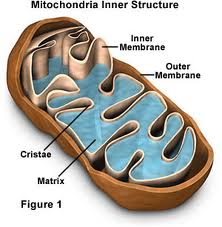Mastering Longevity - Mitochondria

Understanding the Function of Mitochondria
Are you interested in a very long life span? Do you seek extreme longevity? Then you better understand the function of your mitochondria and their role in your metabolism. For it is mitochondria that convert fuel to the energy for our cells. And their failure is the cause of most of the diseases of old age.
Mitochondria convert fuels (fat, glucose, proteins) and oxygen into adenosine triphosphate (ATP) via a complicated process known as the Kreb cycle. You can think of ATP as the power molecules. These ATP molecules are used by your cells to perform their functions. The problems occur as the fuel is burned to produce the ATP. Free radicals (mainly H202 and NOX) are created during this process of providing the ATP fuel. Most of these free radicals are neutralized by antioxidants, but some actually damage the mitochondria. Others damage DNA and other parts of the cell.
This damage to the mitochondria is self-reinforcing. Damaged mitochondria create more free radicals that create even more damage to the mitochondria and the cell body. As the mitochondria become damaged they begin producing less energy for the cell. Without energy your cells slow down metabolically and weaken. Damaged mitochondria can also signal a self-destruction routine in the cell known as apoptosis, resulting in the death of the cell.
Cells with damaged mitochondria are often deformed. They perform their functions sluggishly. Most of the problems of old age are related to these sluggish cells. These diseases include gout, diabetes, most cancers (due to weakened immune systems), dementia, arteriosclerosis, osteoporosis and even cataracts. Repairing the mitochondria would reverse many of these diseases. Protecting the mitochondria would prevent them.
Here are our current options for helping our mitochondria:
-
Resveratrol - This substance found in the skin of red grapes is currently under research. Experiments on mice show that it stimulates the metabolism of mitochondria. Research is underway on understanding this substance and the sirtuins that seem to be activated by it. This can be an expensive supplement to use properly as research shows that useful amounts may be as high as 1-5 grams per day, although it might do some good at lower dosages. Further research should shed some light on this subject. It can also create diarrhea in some people. Research is continuing on resveratrol and how it works with the hope of finding similar substances that can work more effectively in lesser amounts.
- Lipoic acid: Also known as Thioctic Acid and Alpha Lipoic Acid (ALA), it may be able to slow the aging process. Lipoic acid is sometimes known as a master anti-oxidant, due to its ability to regenerate other anti-oxidants. One of these anti-oxidants that Lipoic acid regenerates is glutathione. Glutathione is considered to be the main anti-oxidant protector of mitochondria. Lipoic acid can also cross the blood - brain barrier to help protect the mitochondria in your brain cells. Lipoic acid works in both water and fat, unlike most other anti-oxidants. Your body can make small amounts of lipoic acid and it is found in small amounts in a few mitochondria dense foods like heart, liver, kidneys and brewer's yeast. Supplements are suggested if you want to increase your level of lipoic acid. As for glutathione, it is destroyed in the digestive tract. Lipoic acid is used to help treat diabetic neuropathy.
-
Acetyl-L-carnitine (ALC): ALC is derived from L-carnitine, an amino acid found naturally in the human body. Scientific research shows that ALC can increase the capacity of mitochondria to generate ATP. ALC supplements are normally used in conjunction with lipoic acid supplements.
- Melatonin: Besides the many beneficial hormonal effects on the body like regulating sleep and improving the immune system, melatonin also helps protect mitochondria due to its powerful anti-oxidant effects. Melatonin is another master anti-oxidant like lipoic acid. It directly scavenges free radicals. Melatonin is produced by your pineal gland from tryptophan while you sleep, but production falls as you get older. If you have trouble sleeping, this may be a sign of not enough melatonin being produced. Making sure your sleeping area is completely dark can help produce more melatonin, but everyone should probably take melatonin as some point in their life as they age. Melatonin can increase life expectancy by over a decade if research on mice is relevant at all to humans.
- Avoid Excess Fructose: Small amounts of fructose can be safely absorbed by your liver, but fructose is damaging to mitochondria. The worst culprits are high fructose corn syrups and soda drinks.
-
Calorie Reduction: Reducing calorie intake while maintaining adequate nutrition has been shown to increase the lifespan of mitochondria. Animals fed this kind of diet live significantly longer and healthier lives. This works by simply reducing the workload of the mitochondria, thereby reducing the amount of free radicals produced. It is kind of like making your car engine last longer by driving slower. This may sound difficult, but there are people following this course of action right now in the search for a longer life.
With so many options for protecting and helping your mitochondria, you might become overwhelmed. You may also be limited to a budget. Resveratrol is the currently the most expensive, while melatonin is probably the most cost effective for older people. If you want to live longer, you will need to determine which of these options are best for your budget and circumstances.






